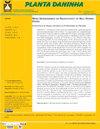白菜作物对生长素类除草剂的耐受性
IF 0.8
Q3 Agricultural and Biological Sciences
引用次数: 3
摘要
摘要:白菜种植区杂草丛生,导致商品白菜产量和质量下降。摘要针对大白菜除草管理困难和注册产品稀缺的问题,本研究旨在评价大白菜品种Astrus Plus对除草剂2,4- d和麦草畏的耐受性。进行了两个实验;一个在受控条件下进行,另一个在野外进行。在第一次试验中,通过测定植株地上部和根部的干物质,评价了除草剂对作物初期生长的影响,并评价了植物的中毒程度。在第二次试验中,植物中毒也与作物产量一起进行了评估。在控制环境下进行分析后,白菜的干物质和植物中毒没有变化,表明白菜对施用除草剂具有耐受性。另一方面,田间试验结果表明,除草剂2,4- d毒害了卷心菜,导致产量下降。麦草畏在种植初期没有对该作物造成任何损害,也没有减少其产量。这些结果表明该除草剂在白菜栽培中的潜在应用。本研究表明,该品种对麦草畏具有较强的耐受性。在受控条件下,2,4- d不会对该品种造成毒性,这与在田间使用时的效果不同,在田间使用时,这种除草剂会杀死卷心菜植株。本文章由计算机程序翻译,如有差异,请以英文原文为准。
Tolerance of Cabbage Crop to Auxin Herbicides
ABSTRACT: The presence of weeds in cabbage cultivation areas causes a reduction in the productivity and quality of the commercial product. Given the difficulties in management and the scarcity of registered products for weed control in cabbage cultivation, this study aimed to evaluate the tolerance of the cabbage cultivars Astrus Plus to the herbicides 2,4-D and dicamba. Two experiments were performed; one under controlled conditions and another conducted in the field. The efficacy of the herbicides on the initial growth of the crop was evaluated in the first experiment, measuring the dry matter of the aerial part, the root of the plant, and evaluating the intoxication of the plants. Plant poisoning was also evaluated in the second experiment, along with crop production. No changes in the dry matter and plant poisoning were observed after the analyses performed in the controlled environment, showing that the cabbage presented tolerance to the applied herbicides. On the other hand, results from the experiments performed in the field showed that herbicide 2,4-D poisoned the cabbage causing reductions in production. Dicamba did not cause any damage in the initial phase of cultivation to this crop, with no reductions in its production. These results indicated the potential use of this herbicide in cabbage cultivation. It can be concluded from this study that the cultivar Astrus Plus is tolerant to dicamba. Under controlled conditions, 2,4-D does not cause toxicity to this cultivar, different from its effect when used in the field, where this herbicide can kill the cabbage plants.
求助全文
通过发布文献求助,成功后即可免费获取论文全文。
去求助
来源期刊

Planta Daninha
Agricultural and Biological Sciences-Plant Science
自引率
0.00%
发文量
0
审稿时长
16 weeks
期刊介绍:
Planta Daninha is a scientific journal published by the Brazilian Society of Weed Science (SBCPD - Sociedade Brasileira da Ciência das Plantas Daninhas). Papers submitted for publication must be sent through an electronic system, on http://www.scielo.br/pd. Works may be written in Portuguese, English, or Spanish, and will be accepted after being reviewed and approved by the Editorial Board. Only papers that have not been published or submitted for publication in other media will be accepted. Articles in Portuguese will be translated to English after being properly corrected and authorized by the authors. Planta Daninha has with goal to publish genuine technical-scientific papers and literature reviews from a critical perspective on Biology, weed management, and related topics.
 求助内容:
求助内容: 应助结果提醒方式:
应助结果提醒方式:


